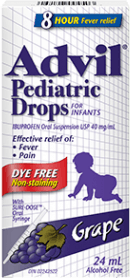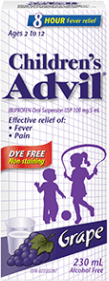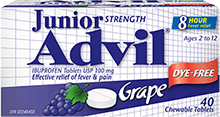Children’s Temperature Chart
How to check your child’s temperature and determine if they have a fever
How to take your child's temperature
Use a digital thermometer as it is easy to read and can measure your child’s temperature quickly. There are different methods to use depending on your child’s age.
Make sure to read and follow the thermometer manufacturer's instructions before use.
Find out what method works best for your child based on the chart below:
| Age | Normal Rectal Temperature | Fever |
|---|---|---|
| Under 5 years old | 36.6°C – 38°C (97.9°F – 100.4°F) |
38.1°C (100.5°F) or higher |
| Age | Normal Ear Temperature | Fever |
|---|---|---|
| Children 2 years & up | 35.8°C – 38°C (96.4°F – 100.4°F) |
38.1°C (100.5°F) or higher |
| Age | Normal Oral Temperature | Fever |
|---|---|---|
| Children 5 years & up | 35.5°C – 37.5°C (95.9°F – 99.5°F) |
37.6°C (99.6°F) or higher |
| Age | Normal Armpit Temperature | Fever |
|---|---|---|
| Children of any age | 36.5°C – 37.5°C (97.8°F – 99.5°F) |
37.6°C (99.6°F) or higher |
A few tips to consider:
- Do not use an oral thermometer to take a rectal temperature, or a rectal thermometer for oral temperature taking.
- Clean the thermometer with cool, soapy water before and after each use.
How to take your child's rectal temperature (for children younger than 5 years old):
Use rectal thermometer only if you are comfortable doing so and a healthcare provider has shown you how to do it safely.
Step 1: Clean the thermometer with cool, soapy water and rinse before use.
Step 2: Coat the tip with petroleum jelly.
Step 3: Place your child on their back with knees bent. Holding the child's bottom, gently insert the thermometer about 2.5cm (1 inch) in the rectum. Keep the thermometer in place for 1 minute until you hear the beep.
Step 4: Remove the thermometer and read the temperature.
Step 5: Clean the thermometer with cool, soapy water and rinse after use.
How to take your child's tympanic/ear temperature (for children ages 2 and older):
Step 1: Clean the thermometer with cool, soapy water and rinse before use.
Step 2: Gently tug the ear to pull it back. This straightens the ear canal to get a better reading.
Step 3: Insert the thermometer gently until the ear canal is sealed off.
Step 4: Squeeze the button and hold down for 1 second.
Step 5: Remove the thermometer and read the temperature.
Step 6: Clean the thermometer with cool, soapy water and rinse after use.
Note: use a clean probe tip every time and follow the manufacturer’s instructions carefully. Crying, ear infections, and ear wax do not significantly affect the reading.
How to take your child's oral temperature (for children ages 5 and older):
Step 1: Clean the thermometer with cool, soapy water and rinse before use.
Step 2: Carefully place the tip of the thermometer under the tongue.
Step 3: Have your child hold the thermometer in place by keeping lips closed—without biting it—for about 1 minute until you hear the beep.
Step 4: Remove the thermometer and read the temperature.
Step 5: Clean the thermometer with cool, soapy water and rinse after use.
Note: Wait at least 10 minutes after your child drinks hot or cold liquids before taking his or her temperature. You may want to avoid this method if your child is unable to breathe through their nose while taking their temperature since mouth breathing lowers the temperature reading.
How to take your child's under the arm temperature (for children of any age):
Step 1: Clean the thermometer with cool, soapy water and rinse before use.
Step 2: Place the tip of the thermometer in the center of your child's armpit, making sure the arm rests snugly against the body.
Step 3: Hold it under the armpit and wait 1 minute until you hear the beep.
Step 4: Remove the thermometer and read the temperature.
Step 5: Clean the thermometer with cool, soapy water and rinse after use.
Contact your physician as soon as possible if your child:
- has a fever and is younger than 6 months old
- has a temperature over 40° C (104° F ) and is older than 3 months old
- has a history of febrile seizures
- has a fever that lasts longer than 72 hours
- cries inconsolably, looks or acts very sick, has diarrhea or repeated vomiting or difficulty awakening, has signs of dehydration or refuses to drink
- develops any unusual or severe symptoms, such as a stiff neck, confusion, rash with fever, difficulty breathing, or seizures
- appears to be getting worse
- has a fever and sickle cell anemia
- cries inconsolably, looks or acts very sick, has diarrhea or repeated vomiting or difficulty awakening, has signs of dehydration or refuses to drink
- develops any unusual or severe symptoms, such as a stiff neck, confusion, rash with fever, difficulty breathing, or seizures
- appears to be getting worse
- has a fever and sickle cell anemia
The information provided above does not substitute medical advice. Consult your Healthcare Professional or Pharmacist for more information. This information is provided for informational purposes only and is not intended as a substitute of any kind for professional medical advice, diagnosis or treatment of a qualified professional as required. Speak to your healthcare professional before making any changes to your lifestyle, or beginning or discontinuing any course of treatment. Never disregard professional medical advice or delay in seeking it because of something you have read on this site.






